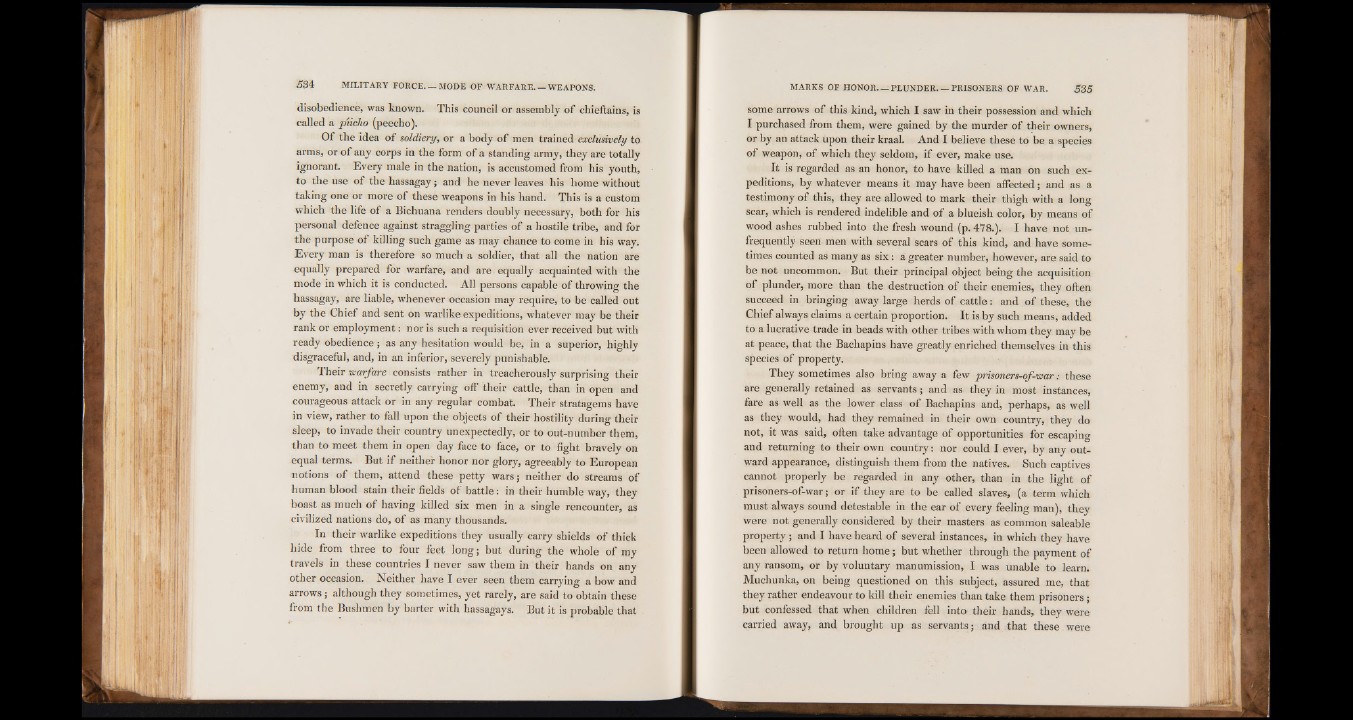
disobedience, was known. This council or assembly of chieftains, is
called a piicho (peecho).
Of the idea of soldiery, or a body of men trained exclusively to
arms, or of any corps in the form of a standing army, they are totally
ignorant. Every male in the nation, is accustomed from his youth,
to the use of the hassagay; and he never leaves his home without
taking one or more of these weapons in his hand. This is a custom
which the life of a Bichuana renders doubly necessary, both for his
personal defence against straggling parties of a hostile tribe, and for
the purpose of killing such game as may chance to come in his way.
Every man is therefore so much a soldier, that all the nation are
equally prepared for warfare, and are equally acquainted with the
mode in which it is conducted. All persons capable of throwing the
hassagay, are liable, whenever occasion may require, to be called out
by the Chief and sent on warlike expeditions, whatever may be their
rank or employment: nor is such a requisition ever received but with
ready obedience ; as any hesitation would be, in a superior, highly
disgraceful, and, in an inferior, severely punishable.
Their •warfare consists rather in treacherously surprising their
enemy, and in secretly carrying off their cattle, than in open and
courageous attack or in any regular combat. Their stratagems have
in view, rather to fall upon the objects of their hostility during their
sleep, to invade their country unexpectedly, or to out-number them,
than to meet them in open day face to face, or to fight bravely on
equal terms. But if neither honor nor glory, agreeably to European
notions of them, attend these petty wars; neither do streams of
human blood stain their fields of battle: in their humble way, they
boast as much of having killed six men in a single rencounter, as
civilized nations do, of as many thousands.
In their warlike expeditions they usually carry shields of thick
hide from three to four feet long; but during the whole of my
travels in these countries I never saw them in their hands on any
other occasion. Neither have I ever seen them carrying a bow and
arrows; although they sometimes, yet rarely, are said to obtain these
from the Bushmen by barter with hassagays. But it is probable that
some arrows of this kind, which I saw in their possession and which
I purchased from them, were gained by the murder of their owners,
or by an attack upon their kraal. And I believe these to be a species
of weapon, of which they seldom, if ever, make use.
It is regarded as an honor, to have killed a man on such expeditions,
by whatever means it may have been affected; and as a
testimony of this, they are allowed to mark their thigh with a long
scar, which is rendered indelible and of a blueish color, by means of
wood ashes rubbed into the fresh wound (p. 478.). I have not un-
frequently seen men with several scars of this kind, and have sometimes
counted as many as six: a greater number, however, are said to
be not uncommon. But their principal object being the acquisition
of plunder, more than the destruction of their enemies, they often
succeed in bringing away large herds of cattle: and of these, the
Chief always claims a certain proportion. It is by such means, added
to a lucrative trade in beads with other tribes with whom they may be
at peace, that the Bachapins have greatly enriched themselves in this
species of property.
They sometimes also bring away a few prisoners-of-war: these
are generally retained as servants; and as they in most instances,
fare as well as the lower class of Bachapins and, perhaps, as well
as they would, had they remained in their own country, they do
not, it was said, often take advantage of opportunities for escaping
and returning to their own country: nor could I ever, by any outward
appearance, distinguish them from the natives. Such captives
cannot properly be regarded in any other, than in the light of
prisoners-of-war; or if they are to be called slaves, (a term which
must always sound detestable in the ear of every feeling man), they
were not generally considered by their masters as common saleable
property ; and I have heard of several instances, in which they have
been allowed to return home; but whether through the payment of
any ransom, or by voluntary manumission, I was unable to learn.
Muchunka, on being questioned on this subject, assured me, that
they rather endeavour to kill their enemies than take them prisoners;
but confessed that when children foil into their hands, they were
carried away, and brought up as servants; and that these were